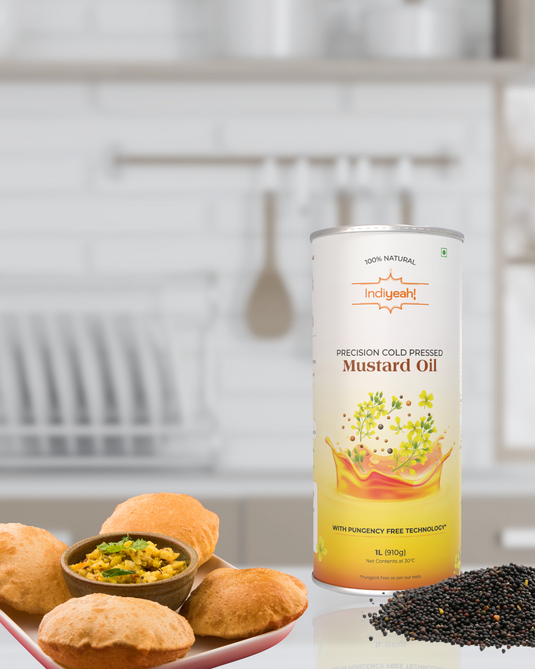In today’s globalized market, imported products like olive oil have become increasingly popular, often quoted as the "healthier" choice. But we often wonder “Are they the best option for our style of cooking?? Rich in tradition and flavor, Indian cooking demands oils that harmonize with its unique cooking styles, spices, and nutritional requirements. Even if we can afford the high cost, does it sustain high heat? Can it be used for sauteeing or tempering? Is it healthier than indigenous oils such as Indiyeah cold-pressed oil? To Answer these better, we first have to know different types of Olive oils.
Understanding Olive oil
Olive oil is a versatile and healthy oil, but its suitability depends on the type of olive oil and the cooking method. The adjectives, extra virgin, virgin, pure, and light have specific meanings which if not understood can be quite misleading.
1. Extra Virgin Olive Oil (EVOO)
Extracted by cold pressing method, it is unrefined, flavourful, and has a robust aroma. High in antioxidants and polyphenols, it is quite healthy. But, it is suited only for no-heat dishes like salad dressings, dips, drizzling over soups, pasta, or roasted veggies to enhance flavor. It also works well in marinades, spreads, and raw dishes like hummus. To some extent it may be used for gentle sauteing but is not ideal for cooking in high-heat frying or roasting, as it degrades.
2. Virgin Olive Oil
This is a slightly “refined” version of olive oil which retains much of its taste. But due to the “limited” refining, it can be used for medium heat cooking like shallow frying, stir frying, or simmering sauces and baking.
3. Pure or Refined Olive Oil
“Pure” olive oil is highly refined, possesses a light flavor and is more suitable for high-heat cooking. This is the highly marketed version of olive oil easily available in the market. Its nutritional value is much less when compared to extra virgin olive oil.
4. Light or Pomace Olive Oil
This version of olive oil is extracted either at high temperatures or by chemical methods from the pulp of cold-pressed olives. It has minimal flavor and nutrients. It is also highly marketed as suitable for high-heat cooking, and large-scale cooking. It's the least nutritious olive oil and doesn't have any distinctive health benefits.
Contrary to popular belief, all forms of olive oil are not healthy, The healthiest version of olive oil is cold-pressed extra virgin olive oil (EVOO). Its health benefits come from the cold-pressing process, which preserves its natural nutrients, antioxidants, and polyphenols without involving heat or chemicals. Other types of olive oil, processed with heat or chemicals, lose much of their nutritional value and health benefits.
It is now established that any oil, when cold pressed retains maximum nutrition, and upon refining loses its health benefits. Next comes a comparison of its nutritional value to our indigenous oils, like Indiyeah cold-pressed oils. Are olive oils really highly nutritious when compared to our local oils?
Nutrient Composition of Oils

When comparing olive oil to locally available oils such as sesame, mustard, and groundnut oil, there is minimal nutritional difference in terms of their calorie and fat content. Local oils often provide an even better balance of monounsaturated fatty acids (MUFA) to polyunsaturated fatty acids (PUFA), making them excellent for maintaining heart health and reducing inflammation.
According to WHO, Geneva; NIN, India, the ideal ratio of monounsaturated fatty acids (MUFA) to polyunsaturated fatty acids (PUFA) in cooking oils is approximately 1:1 to 1.5:1. This balance is considered optimal for supporting cardiovascular health and maintaining overall lipid balance in the diet. Oils such as groundnut (peanut) oil and sesame oil are closer to this ideal ratio compared to other commonly used oils.
Benefits of Indigenous Oils in Indian Cooking
-
High Heat Resistance
Oils like groundnut, sesame, and mustard are naturally suited for high-heat cooking. They withstand deep frying and tempering processes without breaking down, ensuring the dishes retain their flavor and safety. - Rich Nutritional Profile
- Mustard Oil: Rich in omega-3 fatty acids, mustard oil has anti-inflammatory properties and is beneficial for heart health.
- Sesame Oil: Packed with antioxidants and essential fatty acids, it promotes skin health and boosts immunity.
- Groundnut Oil: High in monounsaturated fats, it aids in controlling cholesterol levels.
-
Complementary Flavor Profiles
Indigenous oils blend seamlessly with Indian spices, enhancing the taste of curries, dals, and stir-fries. For example, mustard oil’s pungent aroma elevates Bengali dishes, while sesame oil is indispensable in South Indian delicacies. -
Environmental and Economic Impact
By choosing locally sourced oils, you reduce the carbon footprint associated with importing goods. Additionally, supporting local farmers and oil producers helps sustain traditional agricultural practices and strengthens rural economies.
Cold-pressed oils, extracted at low temperatures and without chemicals, retain their nutrients and natural flavors. They are free from harmful chemicals and preservatives, offering a healthier alternative to refined oils. These oils also align with Ayurvedic principles, which emphasize the consumption of natural and minimally processed foods for holistic health. Be it olive oil, Groundnut oil, Sesame oil, Mustard oil, or coconut oil, when cold pressed, it retains maximum nutrients.
While olive oil has its merits, it simply isn’t suited for Indian cooking’s diverse and high-heat requirements. It’s time to break the myth that olive oil is inherently superior to our indigenous oils and start trusting the wisdom of our traditional oils and methods. Oils like mustard, sesame, coconut, and groundnut have nourished generations, perfectly aligned with our climate, cuisine, and health needs. These ancient oils, especially when cold-pressed, retain their nutrients, offer balanced fat profiles, and support heart health and overall well-being. Let’s shift back to our roots, embrace these time-tested oils, and celebrate the health and sustainability they bring to our lives. It's not just a choice—it's a reconnection with our heritage
Indigenous oils not only align with our culinary traditions but also provide better nutritional benefits and support sustainability. By choosing locally sourced, cold-pressed oils, you make a healthier choice for your family and a responsible choice for the planet.
Promote local, eat local, and cook local—because nothing complements Indian food better than oils that are deeply rooted in its soil and traditions.
Reference :




